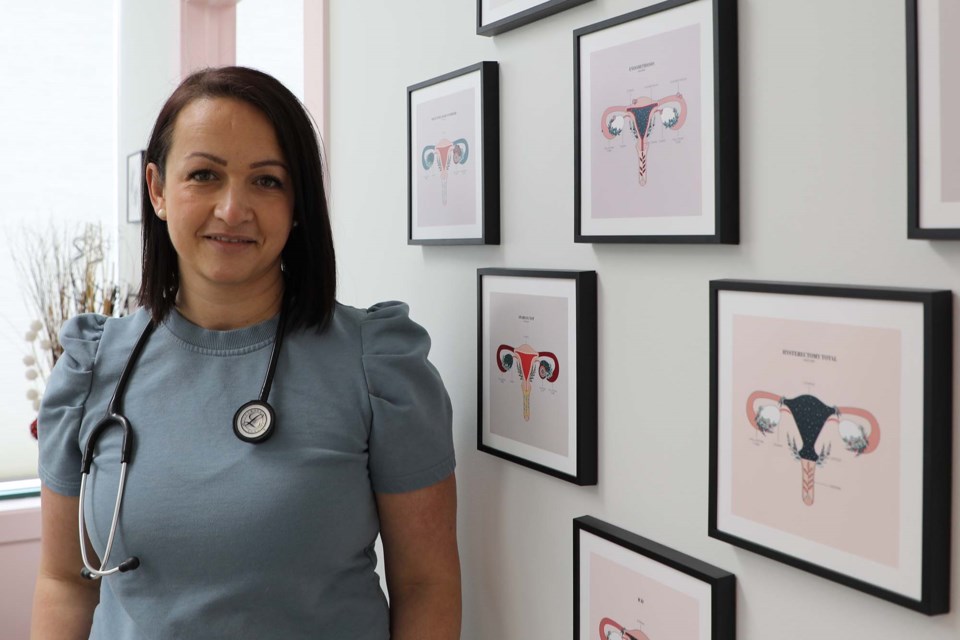St. Albert doctor, Dr. Ioana Solomon, said when she can talk to women about the reason they want to delay having children for a couple years, COVID tends to come up.
A Canadian social survey found that nearly a quarter of people between the ages of 15 to 49 have changed fertility plans because of the pandemic and 19 per cent of those people reported they wanted to have fewer children or children later than previously planned.
The survey was examined in a Statistics Canada article released on Dec. 1. It is the first survey in the series COVID-19 and Wellbeing (CSS-CW). Data was collected from a stratified sample of 20,000 dwellings which were selected "probabilistically" across Canada. The information was collected from any one member of a household aged 15 and older.
Solomon opened Full Circle Women’s Clinic in January. She is a family practitioner and sees women of all ages for a variety of issues.
She has women fill out a questionnaire before she sees them and one of the questions asks women about when they plan to have children.
“Over the last year, I've seen a lot ‘in the next one to two years,’” she said. “If we ever get them into the details [of] talking about ‘my choice of contraception — long-term versus short-term contraception,’ the reasons are related with COVID, job, and income security. ... I think it's a bit financial and a bit of a COVID situation.”
The study said changes to timing were more common than changes related to number of children. Of the people surveyed, 14 per cent said they were postponing having children due to the pandemic. This is meaningful as Canada is a late-childbearing country, and on average the age of mothers at the time of delivery was 31.3 years in 2021.
Solomon said women who are in the age range of 28-35 are the ones reporting they want to have children in the near future to two-year range.
But waiting to have children at a later date can have consequences.
“So, the beginning of the decline in fertility starts at 32,” she said.
Solomon said 91 per cent of women can get pregnant by the age of 30. That number goes down to 70 per cent at age 35 and “maybe 50 per cent by age 40.”
When compared to other factors, such as diet, stress, and alcohol consumption, Solomon said it’s been found that age is very important.
Men are not as affected by age when it comes to fertility, but data from the survey noted men and women were equally likely to change fertility plans because of the pandemic, but women (12 per cent) were slightly more likely to want fewer children than men (10 per cent of those surveyed).
For the most part, people who had no children at the time of the survey said they now want children later than previously planned or want to have fewer children than previously planned compared to those who were already parents at a rate of 25 per cent versus 12 per cent, respectively.
The data also noted three in 10 people (31 per cent) age 25 to 34 wanted fewer children or children at a later date due to the pandemic. The study stated these changes were “significantly less likely among both the youngest childbearing group (aged 15 to 24) and the oldest (aged 35 to 49).”
The study also found that people in living-apart-together relationships and people belonging to groups designated as visible minorities were more likely to have fewer or later children due to the pandemic.
On the other side of the quarter of people that have changed their fertility intentions due to COVID, four per cent reported the opposite. Those in that category reported they now wanted more children or to have a child at an earlier date.
Dr. Dave Smithson from Edmonton's Pacific Centre for Reproductive Medicine said throughout the pandemic fertility clinics have reported a demand for services.
His clinic sees patients who are, on average, in their late 30s.
“Those who are in the family planning phase may be considering waiting, those who are in the more ‘action’ phase are, in fact, looking to build their families more than ever,” he said in an email.
The contributing factors behind the demand in fertility clinics are numerous. Smithson said people have more time at home and more time to consider growing their family. They have also possibly been able to save more money due to reduced leisure and non-essential spending, and, “as such, have more resources for pursuing fertility treatments, which are not covered by governments in most provinces,” he wrote.
Despite this increased demand in fertility clinic services, Canada overall has seen a decline in its fertility rate that seems to have intensified during the pandemic.
“Canada’s fertility rate decreased from 1.47 children per woman in 2019 to a record low of 1.40 children per woman in 2020. Also, in 2020 Canada experienced the lowest number of births and greatest year-over-year decrease in births (-3.6 per cent) since 2006,” according to Statistics Canada.
The report stated that although the data suggests the pandemic has had a negative impact on childbearing in the country, it can’t pinpoint the magnitude or duration.
“Indeed, it could be argued that 2020’s lower fertility rate may simply reflect the continuation of long-standing trends.”




